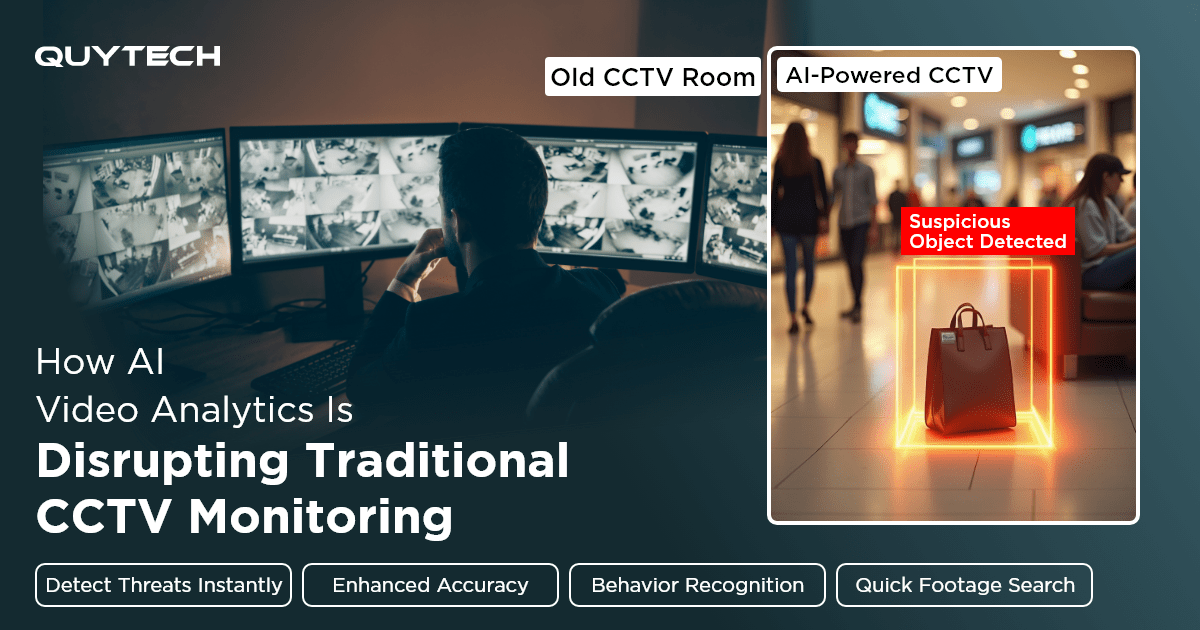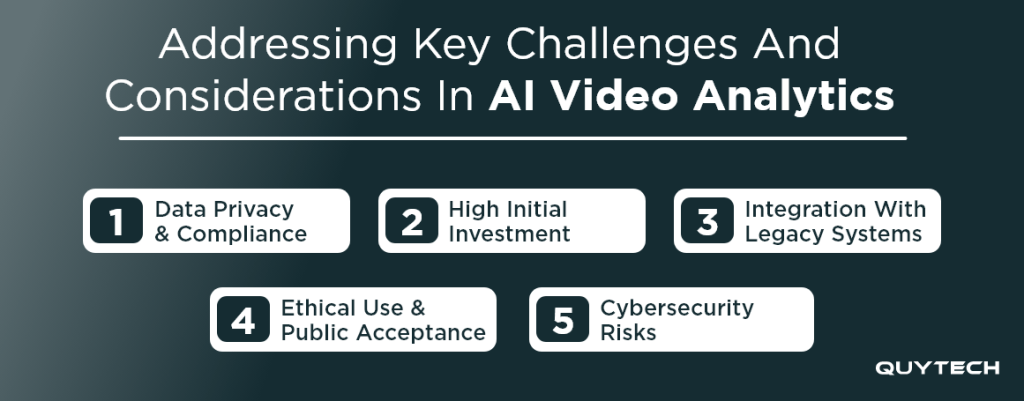Gone are the days when security personnel were glued to screens, yawning while looking out for threats. Some threats were caught, while others were missed. Catching a threat timely used to be a game of luck. But AI video analytics has turned the tables.
AI Video analytics transforms the old passive surveillance system into a real-time acting one, leveraging artificial intelligence, machine learning, and computer vision. With these advanced technologies, AI video analytics analyzes video feeds in real-time and takes action accordingly.
If you’re curious about how AI video analytics is disrupting traditional CCTV monitoring, you’re at the right place. This blog covers everything from market position and benefits to challenges and key use cases.
What is AI Video Analytics
AI video analytics acts like an observer, silently watching every event as it occurs. What makes it stand out is its proactive approach. Unlike traditional surveillance, where cameras simply recorded footage, AI video monitoring goes a step further.
Intelligent video analytics observes and can differentiate between usual and unusual activities. It does not depend on human operators. AI video surveillance identifies the anomalies and then triggers alerts to the security personnel. Its detection goes beyond accuracy, eliminating the chances of false alarms.
Market Stats of AI Video Analytics
- As per a report by Precedence Research, the global video analytics market is expected to reach about $94.56 billion by 2034.
- The report also states that North America took about a 40% share of the global AI video analytics market in 2024.
- According to a report by Future Market Insights, the Asia-Pacific region is projected to expand at the highest rate in the global AI video analytics sector.
Limitations of Traditional Video Monitoring Systems
In a world where incidents occur in a gust, depending on a passive surveillance system can have its limitations. Here are some core limitations that make traditional video monitoring systems ineffective:
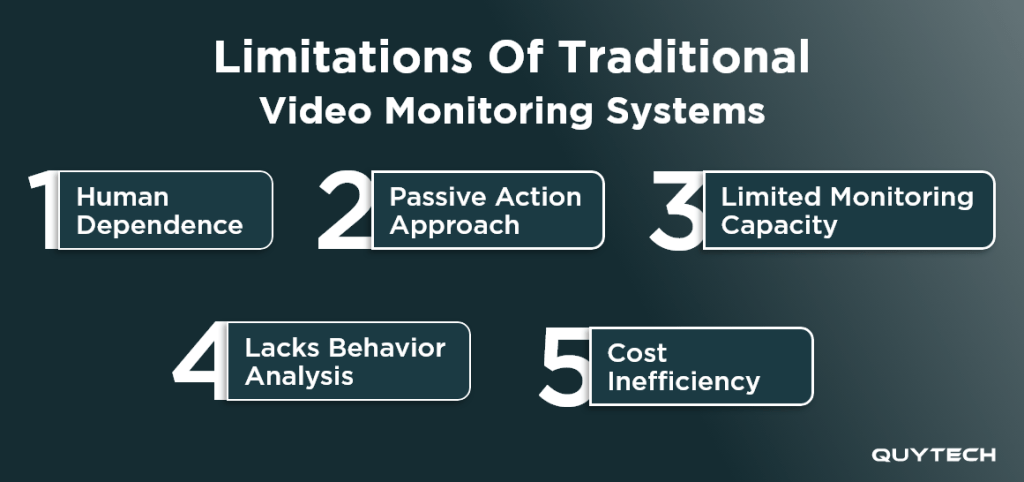
Human Dependence
As you may already know that traditional surveillance depends on human operators. This means that it is not capable of taking any action. It can only capture and store video footage. Traditional video monitoring systems work only if humans operate them.
Passive Action Approach
Like already mentioned, the traditional video surveillance only captures and stores video footage. This means that to initiate any action for any incident, the security personnel will need to go through all the footage. The system is not capable of reporting incidents by itself.
Limited Monitoring Capacity
Traditional video monitoring systems are operated by staff. The staff can focus on a few screens at a time. Which means that there are chances that the incidents can be overlooked. Human operators get tired and bored, which adds to the issue of overlooking events.
Lacks Behavior Analysis
Traditional CCTV monitoring systems are not trained to observe. They lack behaviour analysis. This indicates that if any unusual event takes place, the system will not be able to flag it. If the staff gets distracted and any incident occurs, the video monitoring system cannot detect it.
Cost Inefficiency
The costs of handling traditional video surveillance systems are quite high. To effectively observe multiple screens, you would require a bigger team of security personnel. This means more cost for hiring more staff.
Similar Read: AI Video Analytics for Infrastructure: Use Cases & Benefits
AI Video Analytics Vs Traditional CCTV Monitoring: A Detailed Comparison
Are you wondering about how AI video analytics is different from traditional CCTV monitoring? Read this table and find your answers:
| Feature | Traditional CCTV Monitoring | AI Video Analytics |
| Monitoring Approach | The traditional CCTV monitoring approach relies heavily on human intervention. | AI video analytics utilizes Artificial intelligence to analyze live video feeds automatically. |
| Detection Speed | The detection speed in legacy systems is delayed. | Detection speed in AI video analytics is very fast, as it detects in real-time. |
| Accuracy | Traditional CCTV monitoring is prone to human error and distraction, hence making it inaccurate. | Intelligent video analysis is very accurate as its models are heavily trained to detect accurately. |
| Scalability | The scalability is limited to the number of screens and operators a business can handle. | Easily scalable as it does not require hiring more people to monitor multiple screens. |
| Cost Efficiency | Not cost-effective as it requires more staff for monitoring. | Cost-effective in the long term, as you don’t have to hire more staff for monitoring. |
| Behavior Recognition | Cannot differentiate between normal and unusual behaviour without human intervention. | Can accurately differentiate between normal and unusual behaviour without human reliance. |
| Object & Entity Classification | Traditional video monitoring cannot classify objects and entities on its own. | Intelligent video analysis systems are trained to classify objects and entities. |
| Response & Alerts | The response and action here depend on human operators. | Automatically triggers alerts and notifications when threats are detected. |
Benefits of AI Video Analytics
AI video analytics brings in a lot of advantages that enhance the way security systems work. Here are some core benefits:
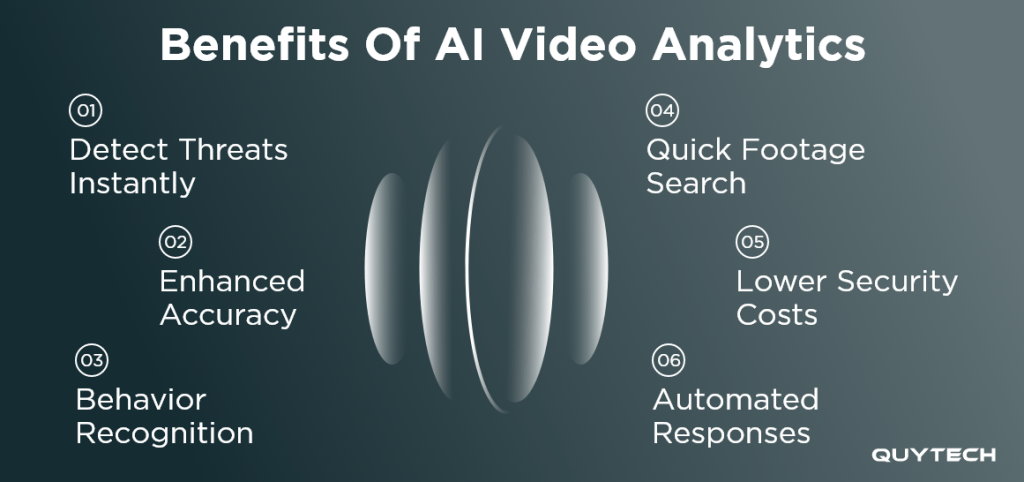
Detect Threats Instantly
AI video analytics systems analyze video feeds in real time. They can differentiate between usual and unusual objects and activities. This helps the system in detecting threats instantly without depending on human operators.
Enhanced Accuracy
The AI video surveillance system works very accurately. It is trained with large amounts of data that helps it accurately segregate objects, humans, and activities based on their appearance. This ensures that the system flags threats accurately, eliminating false positives.
Behavior Recognition
As already mentioned, the system is trained to effectively detect motion. It uses behavior analysis algorithms and anomaly detection to track the activities of people, like loitering, crowding, fighting, etc. This helps in stopping problems at an early stage.
Quick Footage Search
AI video analytics allows the security personnel to access footage without going through it manually. It offers smart footage search, which the staff can use to search a particular video slot by mentioning keywords like ‘fight’, ‘red car’, etc.
Lower Security Costs
An AI-powered video analytics system does not depend on human operators. This means that you would not need a big team to keep an eye on events. This will help in saving the cost spent on hiring additional staff for surveillance purposes. The system alone can handle multiple screens without fatigue.
Automated Responses
Apart from sending alerts and notifications, AI-powered video analytics does more. It analyzes the situations and takes security measures when needed. If it detects smoke, it will send alerts and trigger safety measures like turning on the fire alarm.
How AI Video Analytics is Transforming CCTV Surveillance Across Industries
Curious about how AI video analytics works across different industries? Read and discover it yourself:
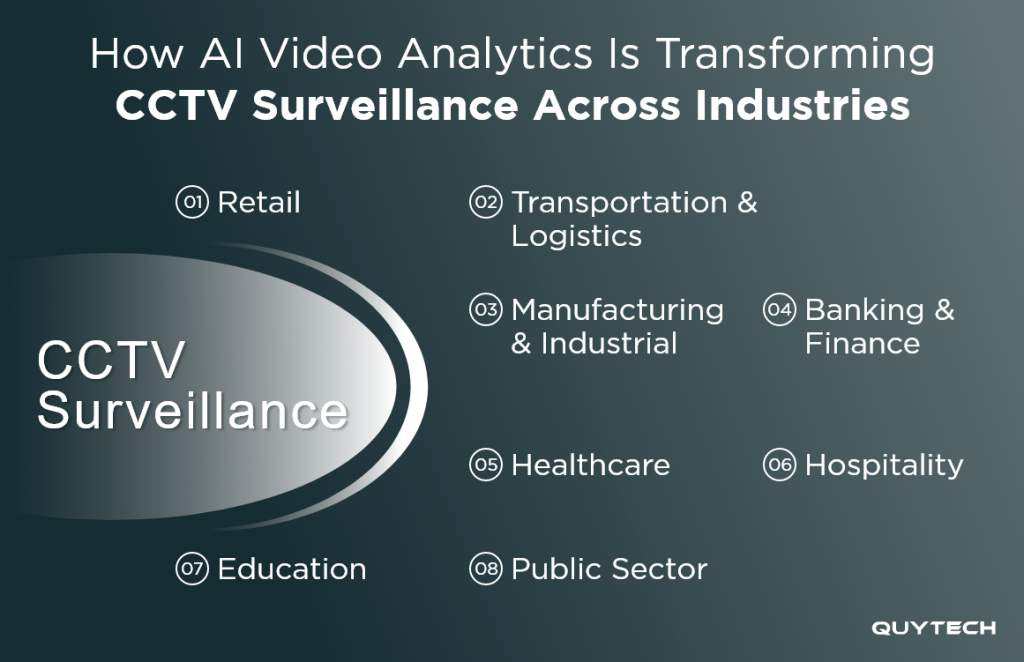
Retail
In the retail sector, intelligent video monitoring helps in detecting activities like loitering and shoplifting. It also helps in measuring foot traffic patterns. The insights gathered from this data help in optimizing store layouts to enhance sales.
Transportation & Logistics
AI video security systems in transportation and logistics help in monitoring crowd movements. It uses object detection models to detect unattended objects. AI-powered video analytics monitors traffic congestion to prevent accidents.
Manufacturing & Industrial
In manufacturing and industrial sectors, intelligent video analysis helps in ensuring safety compliance. It checks out for PPE(personal protective equipment) compliance, workplace safety, and prevents unauthorized access to restricted areas.
Banking & Finance
AI video security systems in finance and banking work by preventing ATM tampering, robbery, and fraud attempts. It monitors cash handling and alerts the security staff as soon as any threat is detected.
Healthcare
In healthcare, AI video analytics technology works by monitoring patients, controlling access to areas like the ICU, operating theatres, etc. It provides real-time alerts to staff when any anomaly is detected.
Hospitality
AI video surveillance in hospitality functions enhances guest safety in hotels, resorts, etc. It manages crowds during events and functions and prevents non-staff entry in authorized areas.
Education
In the education sector, AI-powered video surveillance analytics works by strengthening campus security. It monitors 24/7 and helps in preventing intruders from entering the premises. It also manages gatherings during events and ensures safety.
Public Sector
AI in video analytics, when implemented in the public sector, helps in managing public events and protests. It detects crimes or suspicious activities, identifies vehicles, and assists investigations with quick footage search.
Similar Read: Video Monitoring Systems Development: A Complete Guide
Addressing Key Challenges and Considerations in AI Video Analytics
While AI in video analytics introduces advancements, the implementation process comes with certain challenges and considerations. These are:
Data Privacy & Compliance
AI in video analytics captures every motion, behaviour, and even the identities of people. This can raise serious privacy concerns. To avoid legal penalties, companies must ensure that they comply with laws regarding privacy.
High Initial Investment
The cost of implementing AI video analytics into your business can be high in the initial stages. This is because the system needs advanced hardware as well as software for the setup, which ends up hiking the investment.
Integration with Legacy Systems
While AI video analytics can be integrated into legacy systems, compatibility is usually limited to hardware that isn’t too outdated. And the integration process itself is not very simple, so the complexity turns out to be a major challenge at times.
Ethical Use and Public Acceptance
Just like any other technology, the use of AI video surveillance systems should also be done ethically. Transparency about capturing, storing, and using data must be maintained. This ensures that the people do not feel uncomfortable with continuous surveillance.
Cybersecurity Risks
The intelligent video surveillance systems use cloud platforms for storing the data. These systems are connected with servers, which creates cybersecurity threats. Utilizing security measures like encryption, firewalls, etc. can help in preventing such threats.
How Quytech Assists in Implementing Intelligent Video Surveillance
Quytech builds you the best AI video analytics solutions. Backed by over 14 years of experience, we bring you a team of capable and dedicated developers with talent and expertise to develop a video analytics solution you envision.
Our team leverages advanced technologies like machine learning and computer vision. With these, we deliver high-performance systems that integrate seamlessly with your existing infrastructure.
Our proven experience in similar projects, like AI fire detection, AI car damage detection, AI-powered fall detection, and many more, reflects our dedication towards developing AI-powered video solutions.
Conclusion
Implementing AI video analytics can be the turning point your security system needs. AI video analytics does much more than mere surveillance; it takes the right action at the right time. Without human interference, intelligent monitoring systems can do what traditional systems couldn’t, even with human involvement.
With benefits like instant threat detection, advanced accuracy, cost efficiency, and automated responses, AI video analytics is a worthwhile investment. By adopting this technology, businesses not only take a step towards smart surveillance but also gain a competitive advantage.
FAQs
Yes, AI video analytics can work with your existing CCTV cameras. The integration process can be complex, but it is possible.
Yes, AI video analytics can eliminate false alarms to a great extent. It keeps earning and improving, so the accuracy enhances over time.
Yes, AI video analytics can be customized to your needs and can be tailored to detect specific behaviors, objects, or activities relevant to your business or industry.
No, even without a tech team, you can implement AI video analytics in your business. You can hire developers or partner with an AI video analysis solution development company.
